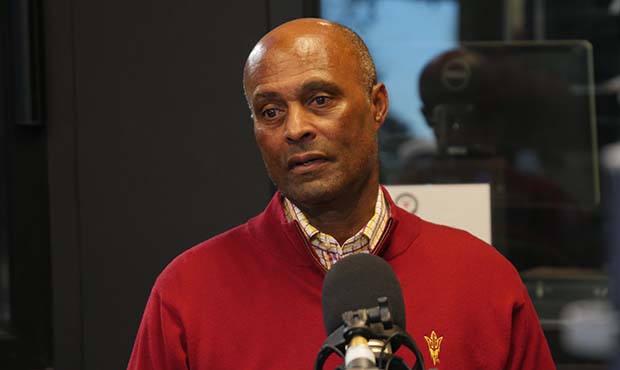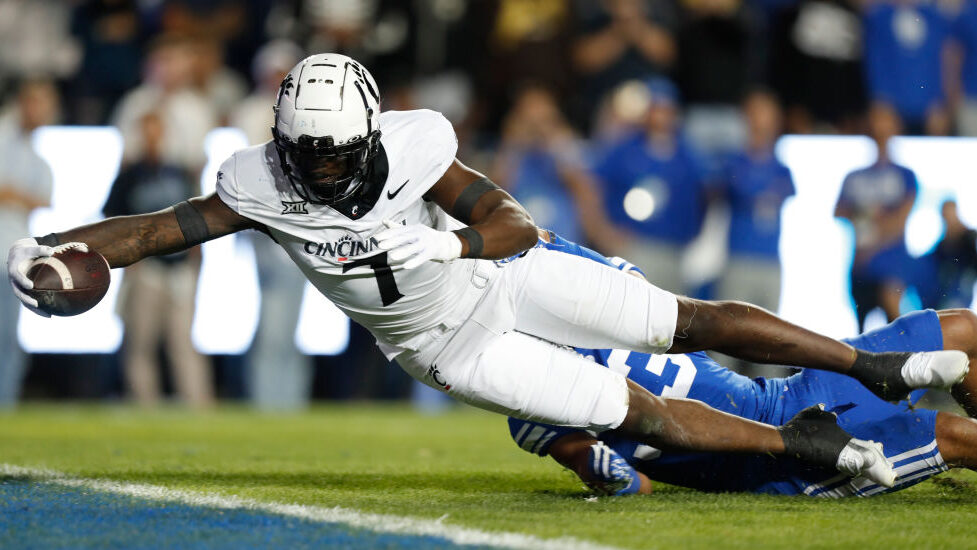Former employee claims ASU fired him for pushing harassment investigation
Feb 20, 2020, 1:16 PM | Updated: Feb 21, 2020, 10:50 am

Arizona State athletic director and VP for university athletics Ray Anderson (Matt Bertram/Arizona Sports)
(Matt Bertram/Arizona Sports)
Arizona State University took nearly five months to investigate a booster for allegedly sexually harassing three wives of ASU athletic department officials, but the school said in a release that a change in an accuser’s story led to the delay.
The school released a statement following a Yahoo! Sports report admitting an internal investigation found that booster and former football player Bart Wear harassed three women, including Leslie Hurley, the wife of men’s basketball coach Bobby Hurley. ASU has since revoked Wear’s season tickets and made him no longer welcome at school events.
According to a notice of claim released to ArizonaSports.com, former ASU senior associate athletic director David Cohen alleged that he lost his job last year “in retaliation for insisting athletic director Ray Anderson and other ASU officials investigate the allegations brought forward by the three women, including (Cohen’s) wife.”
ASU disputes that allegation.
“Mr. Cohen was terminated from the university in August of 2019 after refusing to cooperate with a department reorganization that was planned prior to any complaints about the donor being made,” the school said in the statement released to ArizonaSports.com.
“Related to the donor issue, the university acknowledges that the matter could have been resolved in a quicker timeframe and has taken steps to remind those involved that we have investigative resources to deal with these types of issues as soon as they arise.”
Cohen’s lawyer told Yahoo! that the change-in-story accusation are “semantics.”
An outside review of the allegations by a law firm did not determine Wear was at fault until November.
ASU’s statement said that it did not find Wear had grabbed or sexually assaulted any of the women, but it did conclude he subjected them to unwelcome comments and physical contact.
“In the summer of 2019, after Mr. Cohen’s assertion of new allegations of misconduct by the donor, an investigation took place,” ASU’s statement said. “The university hired an outside law firm to conduct a full and independent investigation of the complaints regarding the donor’s conduct and Mr. Cohen’s allegation of retaliation.”
Cohen is seeking a $1.5 million settlement after he was removed from his job in August and fired in December.
In his notice of claim, Cohen alleges that his wife, Kathy Cohen, was harassed by Wear at the Pac-12 Tournament in Las Vegas last March 14. Kathy Cohen left her seat at halftime of a win over UCLA and walked by Wear to reach the stairs at T-Mobile Arena, and as she tried to pass him, Wear “put his hands on her waist, moved his hands up the side of her body to the sides of her breast, held his hands on the sides of her breasts and said, ‘Dave is lucky to have you.'”
The incident with Kathy Cohen led to two other wives revealing to the Cohens that night that Wear had acted inappropriately to them as well.
Cohen first brought the allegations to Anderson on March 18, 2019, according to the notice of claim provided. An investigation wasn’t launched until late August or early September despite knowledge of multiple incidents involving Wear, Cohen’s notice states.
David Cohen then took the complaint to Anderson on March, 25, per the claim, which added the investigation did not close until mid-November of that year as Wear continued to be involved in ASU athletic events.
“Although Mr. Cohen regularly interacted with this individual at events, he had not previously reported any concerns about his conduct and in fact was responsible for distributing the tickets to the event that placed the donor in proximity to his wife and the other individuals who expressed concerns,” ASU said in its statement. “When Mr. Cohen reported his concerns to colleagues, he indicated he felt the matter could be addressed privately with the donor through a request that he be more mindful of his conduct and respect the personal space of others.”







